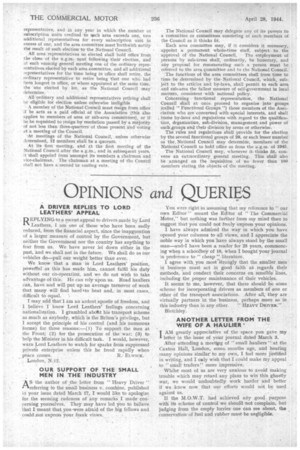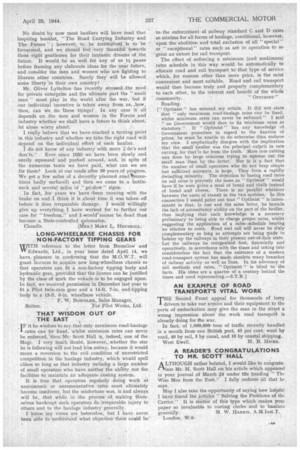OPINIONS and
Page 32

Page 35

If you've noticed an error in this article please click here to report it so we can fix it.
UERTS
A DRIVER REPLIES TO LORD LEATHERS' APPEAL EPLYING-to a recent appeal to drivers made by Lord d Leathers, I am one of those who have been sadly reduced, from the financial aspect, since the inapguration of a larger measure of control by the Government, but neither the Government nor the country has anything to fear from us. We have never let down either in the past, and we shall not in the future. We shall do as our vehicles do--pull our weight better than ever.
• We know that a man in Lord Leathers' position, powefful as this has made him, cannot fulfil his duty without our Co-operation, and we do not wish to take ad-vantage of this. He can rely.upon us. Road hauliers can, have and will put up an average turnover of work that many will find hard 'to beat and, in most cases, difficult to equal. C
may add thatI am an ardent apostle of freedom, and I believe I know Lord Leathers' feelings concerning nationalization. I grumbled abott his transport scheme as much as anybody, which is the Briton's privilege, but I accept the principle of his control (and his numerous forms) for three reasons:—(1) To support the men at the Front; (2) for the prosecution of the war; (3) to help the Minister in his difficult task. I would, however, warn. Lord Leathers to watch for sparks from suppressed private enterprise unles,s this be freed rapidly when peace comes. R. LWICK. London, N.12.
OUR SUPPORT OF THE SMALL MEN IN THE INDUSTRY -A S the author of the letter from "Heavy Driver " 1-Ireferring to the small business v. combine, published in your issue dated March 17, I would like, to apologize for the seeming rudeness of any remark* I made concerning yourselves. They may have led you to believe that I meant that you wereafraid of the big fellows and
could not express your frank views. •
You were right in assuming that my reference to " our own Editor" meant the Editor of "The Commercial Motor," but nothing was further from my mind than to suggest that you• could not freely express your opinions.
I have always admired the way in which you have opened your columns to all views, and I appreciate the noble way in which you have always stood by the small man—and,I have been a reader for 25 years, commencing when a schoolboy of 10, When I bought your journal in preference to " cheap ". literature.
I agree with you most Strongly that the smaller men in business must act in good faith al regards _their methods, and conduct their concerns on sensible lines, including the proper maintenance of their vehicles.
It seems to me, however, that there should' be some scheme for incorporating drivers as members of one or other of the transport associations. After all, they are virtually partners in the business, perhaps more so in this industry than in any other. " HgAvv DRIVER." Bletchley.
ANOTHER LETTER FROM THE WIFE OF A HAULIER AM greatly appreciative of the space you gave my letter in the issue of your journal dated March 3.
After •attending a meetjpg of "small hauliers" at the Caxton Hall, London, some months ago, and hearing many opinions similar to my own, I feel more justified in writing, and I °lily wish that I could. make my appeal to "small traders" more impressive.
Whilst' most of us are very anxious to avoid making trouble which may retard any plans to win this ghastly war, we would undoubtedly work harder and better if we knew now that our efforts would not be used against us.
If the M.O.W.T. had achieved any good purpose with its scheme of control we shoulil not complain, but judging from the empty lorries one can see about, the conservation of fuel and rubber must be negligible.
No doubt by now most hauliers will have read that inspiring booklet, "The Road Carrying Industry and The Future " ; however, to be forewarned is to be forearmed, and we should feel very thankful 'towards these eight gentlemen for their fantastic dreams of the future. It would -be as well for any of us to pause before framing any elaborate ideas for the near future, and consider the men and women who are fighting to liberate other countries.. Surely they will be allowed, some liberty 'in their own country?
Mr. Oliver Lyttelton has recently stressed the need for private enterprise and the ultimate part the "small man " must play in the world after the war, but if our individual incentive is taken away from. us, ..how, then, can We do these things? In any case it all depends on the men and women in the Forces and industry whether we shall have a future to think about, let alone worry about.
I really believe that we have -reached a turning point in this industry and whether we take the right road Will depend on the individual effort of eac-h haulier.
I do not k,now of any industry with more '; do's and don'ts." Ever since 1930 we have been slowly and surely squeezed and pushed around, and, in spite of the numerous taxes we have paid, what can we see for them? Look at our roads after 30 years.of progress. We get a few miles of a decently planned road V(sometimes badly surfaced) and then we come to a bottle neck and several miles of ," go-slow" signs: . In fact, for years we have been running with the brake on and .I think it is about time it was taken off before it does irreparable datnage. I would willingly give up everything I have worked for to further our case for "freedom," and -would sooner be dead than become a State-controlled iutomaton. 'Cheadle, (MRS.) MARY L. HENSHALL.'
LONG-WHEELBASE CHASSIS FOR NON-FACTORY TIPPING GEARS WITH reference to the letter from Bromilow and VV Edwards, Ltd., in your' issue dated April 14, we have pleasure in confirming that the M.O.W.T. will grant licences to acquire new long-wheelbase chassis so that operators can fit a non-factory tipping body and • hydraulic gear, provided that the licence can be justified by the class of work the vehicle is to be engaged upon. In fact, we received permission in December last year to fit a Pilot twin-ram gear and a 14-ft. 7-in. end-tipping -body to a 13-ft. 6-in, wheelbase vehicle.
F. W. BownhEa, Sales Manager, Bolton. , For Pilot Works, Ltd.
THAT WISDOM OUT OF THE EAST -IF it be wisdom to say that only maximum road-haulage rates can be fixed, whilst minimum rates can never be enforced, 'then. Mr, Scott Hall is, indeed, one of the Magi. I very _Much doubt, however, whether the star he is following will not lead him astray, because it would mean a reversion to the evil condition of unrestricted competition in the haulage industry, which would spell chhos so long as that industry indlud/ a large nurnber of small operators who have neither the ability nor the facilities to maintain an adequate costing system.
. It is true that operators regularly doing work at uneconomic or unremunerative rates must ultimately become insolvent, but the misfortune was, is and always will be, that while in the process of, making themselves bankrupt such operators do irreparable injury to others and to the haulage industry generally.
I know my views are heterodox, but I have never been able to understand what objection there could be to, the enforcement of railway standard C and D rates as minima for all forms of haulage, conditional; however, upon the abolition. and total exclusion of all " special " or "exceptional" rates such as are in operation to so 'great an extent for rail transport. The effect of enforcing a minimum (and maiimum) rates schedule in this way would be automatically to allocate road and rail transport to that type of service which, for reasons other than mere price, is the most convenient and most suitable. Road and rail transport would then become truly and properly complementary to each other, to the interest and benefit of the whole community. "OPTIMIST."
Reading. •
[" Optimist" has misread my article. It did not state that "only maximum road-haulage rates can be fixed, whilst minimum rates can never be enforced." I said ." no Government would dare to fix minimum rates as statutory." If " Optimist" has any knowledge of Government procedure in regard to the fixation of prices, he must be unable to do otherwise than endorse my view. I emphatically disagree with the implication that the small haulier was the principal culprit in rate cutting, for that'is far from the truth. More rate cutting was done by large concerns trying to squeeze out the small man than by the latter. Nor is it a fact that the number of small operators who do not keep simple but sufficient accounts, is large. They form a rapidly dwindling minority. The objection to basing road -rates on rail rates is precisely the same as " Optimist" would have if he were giVen a meal of bread and chalk instead of bread and cheese. There is no parallel whatever between the costs of transit in the two systems. In this connection I would point out that" Optimist" is inconsisteht in that, in one and the same letter, be bewails the lack of accountancy ability on the part of the haulier, thus implying that such knowledge is a necessary preliminary to being able to charge proper rates, whilst suggesting the application of a rates .schedule bearing no relation to costs. Road and rail will never be truly complementary so long as attempts are being made to bolster up the railways in their present out-of-dale state. Let the railways be reorganized first, financially and operatively, in accordance with the times and taking into consideration the fact that the existence of a modern road-transport system has made obsolete many branches
• of railway activity as well as lines. In his advocacy of
rail methods and rates, Optimist " is blind to the facts. His ideas are a quarter of a century behind the times and need rejuvenating.—S.T.R.] AN EXAMPLE OF ROAD TRANSPORT'S VITAL WORK THE Second Front appeal for thousands of lorry drivers to take our armies and their equipment to the ports of embarkation may give the man in the street a wrong impression about the work road transpoit is already doing for the war.
In fact, of 1,000,000 tons of traffic recently handled in a month from one British port, 45 per cent, went by road, 40 by rail, 5 by canal, and 10 by coastal shipping..
West Ewell. H. B. HIcirs.
A READER'S CONGRATULATIONS . TO MR. SCOTT HALL ALTHOUGH rather belated, I would like to congratulate Mr. H. Scott Hall on his article which appeared in your journal of March PI under the heading'" The , Wise Men from the East." I fully endorse all that he, says.
May I also take the opportunity of saying hew helpful I have .found the articles "Solving the Problems of the Carrier." It is matfer of this type which makes youi paper so invaluable to costing clerks and to hauliers
generally. M. W. HARRIS, A.M.Inst.T. London, W.6.




















































